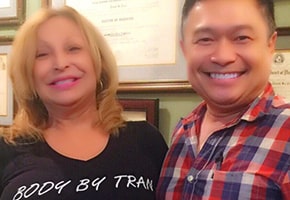Why are women judged and even ostracized by both feminists and the greater public at large if they choose to have cosmetic surgery?
Grace Gold
Jun 24, 2014 at 2:00pm

There, I said it.
And the reason I think it needs to be said is that across the many feminist sites and social media discussions that hit my newsfeed daily, “choice” is celebrated in virtually every forum except for one: cosmetic surgery.
The stigma is so binding that even I –- author of an eBook titled The Boob Job Bible, for chrissakes –- didn’t want to write this xoJane piece for fear it would turn into my top Google search ranking.
To be clear, I love providing a valuable resource for women who want to know how to have a safe and fulfilling breast augmentation based on my own experience and expertise as a beauty journalist. But what if a prospective employer first comes to know of me and my work through an essay on my boob job? Would I be perceived as less intelligent, superficial and insecure –- and even a victim of patriarchy?
But the more I thought about it and how many women are affected by cosmetic surgery –- more than 10 million procedures were had in the US last year alone, according to the American Society for Aesthetic Plastic Surgery (ASAPS) –- the more I realized that this is a long-overdue conversation that someone needs to start.
(Plus after 30, the amount of credence you give to what people think about you plummets with each passing year. This is the icing on the cake of wisdom that comes with age. Just try to eat that slice before 5 p.m., because the metabolism is another issue entirely…)
So here’s what rankles me.
Among those who advocate for women, there’s strong support for your right to make choices about your life and most importantly, your body -– including the reproductive freedom to an abortion — but electing to go under the knife for cosmetic purposes is just one step too far. Shouldn’t women’s choices about body modification –- whether we’re talking makeup, hair color, tattoos, piercings or yes, even cosmetic surgery –- be respected?
Cosmetics and hair color are more accepted without nearly as much rebuke, but can be just as transformative as cosmetic surgery. And yet when you literally boil it down, why is getting a lip injection so much more inane than creating a new lip shape with pencil liner and plumping lipgloss? Why does society get to determine the line between “totally okay” and “too much!” instead of the woman whose face or body we are talking about?
Now I completely understand that many want to encourage a healthy acceptance of the “natural” self in response to the endless parade of dimple-free thighs and pore-less Photoshop messaging we endure every day as women. In fact, I totally applaud and make it a mission to encourage self-acceptance in my line of work.
But is there perhaps another stifling standard sneaking behind critiques of cosmetic surgery? One that dictates only “natural” beauty is “real,” and choosing to shape your looks is somehow “wrong” and definitely not feminist?
This slight has been thrown at women for eons. Even Shakespeare alluded to it when Hamlet insulted Ophelia and all of womankind –- “I have heard of your paintings too, well enough; God has given you one face, and you make yourselves another!”
That whole “damned if you do, damned if you don’t” public perception of female beauty, particularly of those who are aging, has been well-documented by writers like Naomi Wolf and Nora Ephron. And yet it seems the same people who are committed to championing women’s rights continue to perpetuate an equally restrictive standard by imposing only one acceptable choice.
For those who do choose to change something “permanently,” why is it automatically thought of as some kind of sell-out and not simply another choice a woman decides to make about her body? Breast augmentation in particular is rife with controversy since it enters such a sexualized zone, and often evokes the sanctimonious reaction that the procedure is “bad” and any woman who gets it must be emotionally damaged.
At this point, you’re probably wondering why I chose to get my boobs done.
Truth be told, I’ve simply always loved the look of an ample C-cup chest. I suspect that my childhood adoration for old Hollywood films and legends like Jane Russell, Marilyn Monroe and Elizabeth Taylor probably had something to do with influencing my voluptuous preference. Having boobs seemed enjoyable, and I wanted in on the fun.
By the time I was in my 20s, I was ready to get a breast augmentation, but was curbed by anxiety over potential implications in all areas of my life. If people found out, would I be thought of as less smart and capable in my career? Would friends judge me as less authentic? And would the intelligent and emotionally evolved type of guy I’m attracted to be turned off from dating me, and immediately write me off as fake once he found out I had breast implants?
After years of revisiting the idea and stewing over it, I finally reached a conclusion. I told myself: You’ve got one life to live, so why pine for something if you can have it already? Just do it, and rock it. Now, I realize your version of seizing life may look more like a last-minute jaunt to Italy than a new pair of 34C girls, but hey -– people want and like different things. And that’s OK.
I can tell you today that I do have one regret: that I didn’t do it sooner. I had an awesome experience and couldn’t be happier with the results. But I kept the whole story on lockdown, and quite successfully –- it turns out that I was so adept at padding my bra beforehand that no one noticed after I actually had an augmentation. Score!
I was thrilled my secret was under wraps, since there are few things you can do as a woman to elicit more condemnation from friends and total strangers alike than getting breast implants. The shame we shower on cosmetic surgery patients is palpable. I field a flood of desperate emails from readers who are terrified people will castigate them.
Women are afraid of being labeled as a floozy at work, that moms at PTA meetings will gossip and even cancel play dates with kids, that friends, family and life partners will all react venomously. It’s not an unrealistic fear, as this does in fact happen to many. You’d think the offense at hand were some violent hate crime, and not simply a woman buying a cosmetic service.
Sadly, there are very serious implications for this endless social shaming. I discovered through my own experience that the industry remains highly -– obnoxiously, even — unregulated. Basically, any doctor can hang out a shingle and claim to perform cosmetic procedures regardless of their studied specialty, and local and international laws don’t care.
The onus remains on the patient to do the research, and to make sure the surgeon is properly credentialed for the work at hand. Not everyone knows how to do that or is even aware that they need to do that. We end up with horror stories that could have been prevented.
This lack of regulation is part of the underlying problem I outline above: There is no public empathy or advocacy for the cosmetic surgery patient. When something consistently goes wrong in other areas of medicine or on the consumer market, there’s a big outcry, and regulations are passed to protect the patient and buyer. Yet when the worst possible scenario happens to someone getting liposuction or a butt lift, it’s all too common to hear people essentially say, “She got what was coming to her.”
The phrase is frustratingly familiar. We hear the same disempowering slut-shaming argument when a woman is assaulted or raped: She shouldn’t have been wearing that, she shouldn’t have been out at that hour. Even though someone else has actually committed the offense, it’s the woman who is judged as perpetrator and assigned the fault.
This is why I finally stepped far out of my comfort zone to share my experience and to arm the breast augmentation patient with unbiased information to help her make the best decisions for herself. And it’s why I wrote this piece. I would’ve much rather gone about my business quietly without revealing my foray into the plastic surgeon’s office, but that would have contributed to the shaming we do of cosmetic surgery patients.
As women, we have battled long and hard to speak up and have our voices heard. We have, and continue to fight for jurisdiction over our own bodies. By respecting every choice that ownership entails –- including cosmetic surgery -– we can give to others what we ultimately want for ourselves: the freedom to be who we are, and to lead lives of our own choosing.









